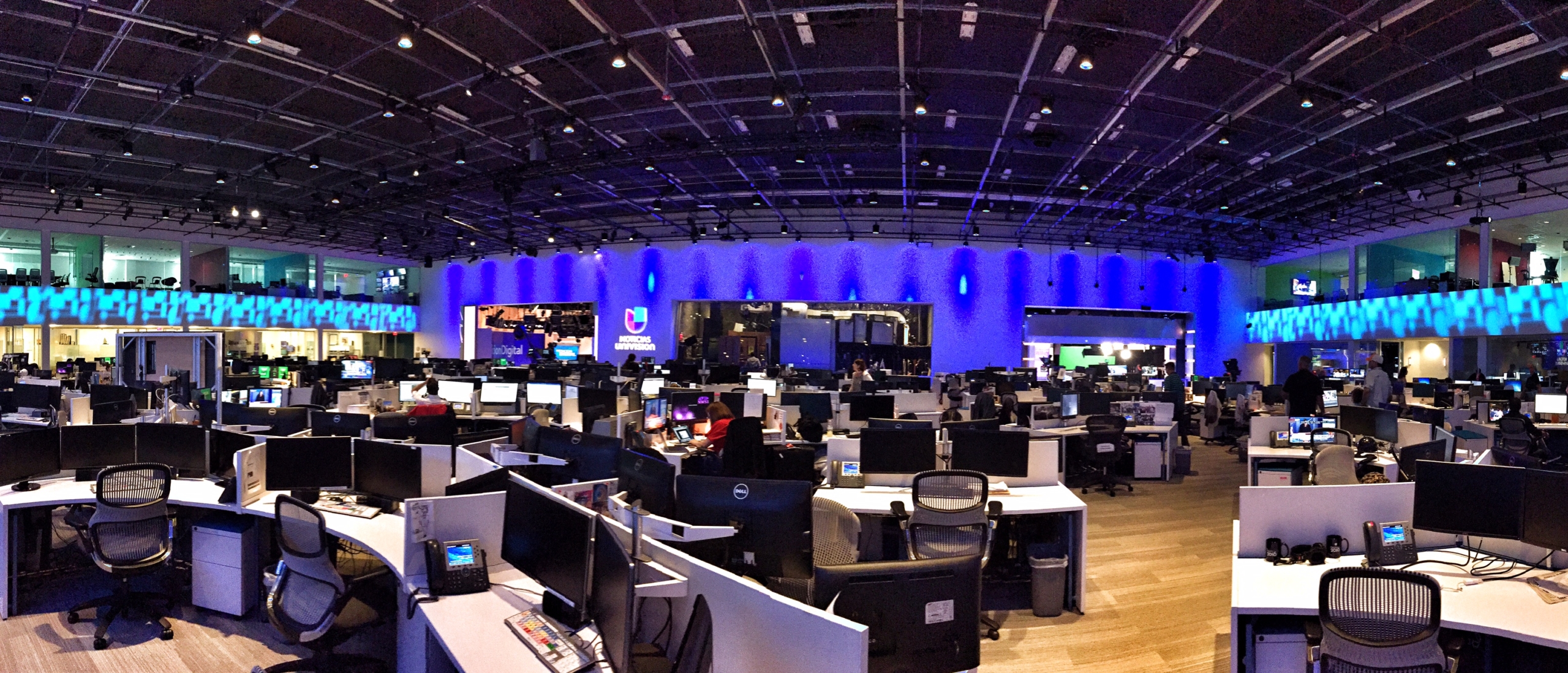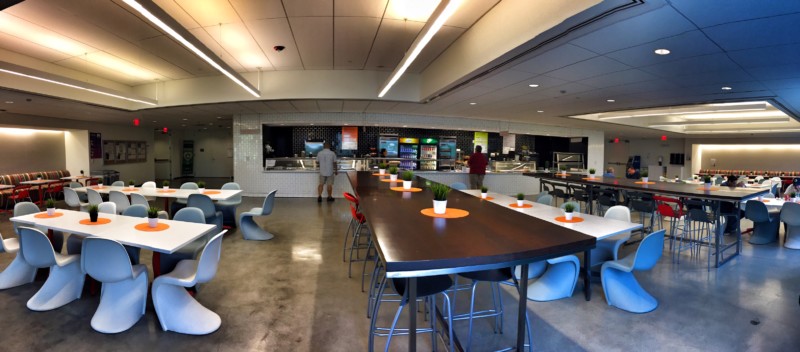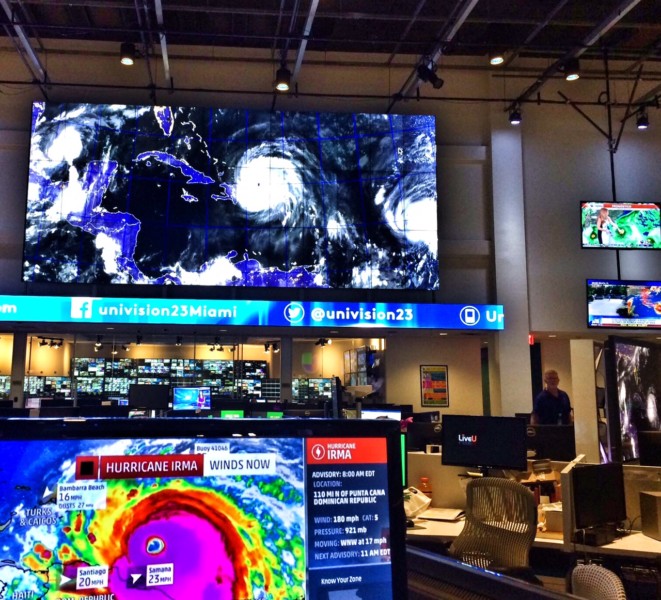Sign up for The Media Today, CJR’s daily newsletter.
As hurricanes pummel Puerto Rico and the Virgin Islands, many news organizations are struggling to keep their audiences up to date on a dizzying range of other stories.
But perhaps no national organization faces as crowded a roster of stories as Univision, the Miami-based news network whose headquarters lie squarely in Hurricane Irma’s path. Univision’s Spanish-speaking audience includes many of those most severely affected by the recent hurricanes in Houston, Puerto Rico, and the Caribbean. Many of the network’s viewers live in southern California, where wildfires are raging, and have relatives in Mexico City, where a magnitude 8 earthquake struck overnight. President Donald Trump’s announcement that he would end DACA also directly impacts the network’s 1.8 million viewers.
“This [situation] is unique for us because we’re trying to cover the news, and we’re part of the story,” says Maria Martínez-Guzmán, the network’s vice president and director of news gathering, in an interview with CJR.
There’s no reprieve on the horizon as Irma, a Category 5 hurricane with wind speeds of 150 mph, is set to strike the company’s head office on Sunday morning after travelling through the Caribbean. “Not only are we going to be reporting on it, it’s probably going to hit us directly,” Martínez-Guzmán says.
ICYMI: Journalists predicted a disaster in Texas. Now it’s close to coming true.
Univision already has teams from Miami covering the storm’s damage to Puerto Rico, where one million people are without power, and the Dominican Republic, which saw 5,500 evacuated. “They’re stuck there, with their families here, [and] with the storm coming here,” Martínez-Guzmán says of her Univision staff members. “So not only do we have the challenge of covering a storm and the devastation in those places, but they also can’t come home to secure their families and their homes. We’re trying to cover the news, and we’re the story. I have people in tears, ‘What am I going to do? What if I have to work?’”
Not everyone is scheduled to work this weekend, and the network told nonessential staff members to prioritize taking care of their families and homes. Some Univision staffers who evacuated Miami to other areas like Orlando also have filed stories about their experience. “Some have taken four hours, others are still stuck on the road since 1 in the morning last night,” says Selymar Colon, Univision’s managing editor and senior director of digital. She spoke to CJR while on her way to the office in a Lyft full of her own groceries as part of her preparations for the weekend. Colon is part of a core team at Univision scheduled to be at the office until Tuesday.
The company has put a plan in place for its 75-person head office in the neighbourhood of Doral, which is not far from the Miami International Airport and in one of the five areas identified by the city as a storm surge zone. The Univision facility, also known as “Newsport,” will be on lockdown starting Saturday, with television production and digital staff scheduled to be working and living inside for “at least 48 hours,” says Martínez-Guzmán. The only exceptions are news crews reporting on the situation outside.
The company has made arrangements for details ranging from beds so staff can catch some sleep to extra gasoline for news-crew vehicles to a cafeteria staff and stocks of food to serve the staff over the weekend. For emergency power, the building is equipped with two Caterpillar 2.25 megawatt generators capable of supporting Newsport for up to 10 days.
Some of the Univision staff who covered Hurricane Harvey are working back-to-back shifts, jumping right into the Irma fray. “I had a cameraman who literally got off the plane from Houston [Wednesday],” Martínez-Guzmán says.
Logistics also had to be arranged for Univision’s digital team working on the network’s website, in the field, and across social media channels. For Harvey, this included round-the-clock staff producing live-blogs, interactive digital graphics, live video-streaming through Grabyo, Facebook Live, YouTube, and Periscope, as well as updates on Twitter and Facebook.
ICYMI: “I’ve never seen lying and obstruction like this.”
Resources for Univision’s digital team include two four-by-four vehicle rentals, two drones to gather aerial before-and-after images of flood damage, as well as hip waders, rain boots, and special cell phone cases that repel water. “That was a big problem in Harvey,” Colon says.
Irma isn’t the only hurricane Univision is covering. The company has sent a crew to the Mexican port city of Veracruz to cover Hurricane Katia, which is currently a Category 2 storm expected to make landfall early Saturday, Martínez-Guzmán says. “I sent a crew from my Mexico City office there. I have a pretty big operation there so I was able to dispatch my reporters, my cameramen, and staff.”
With so much airtime invested in hurricane coverage, Martínez-Guzmán says it’s difficult to fit events like the Pope’s visit to Colombia — what would normally be a massive story — into the national broadcasts. “We spent I don’t know how much money making sure it was a big story. But we didn’t foresee all this happening,” she says. “We have packages ready but it probably won’t air.”
Univision officials say they aren’t worried about the cost of covering so many record-setting disasters across such a wide geographic area. “Our bosses down the line have said do whatever we need to do to keep our crews as safe as possible,” Martínez-Guzmán says.
The most important thing is to make sure Univision’s journalists are where things are happening. “I send my crews,” Martínez-Guzmán says. “Later I worry if it’s going to make it on the air.”
Has America ever needed a media defender more than now? Help us by joining CJR today.





